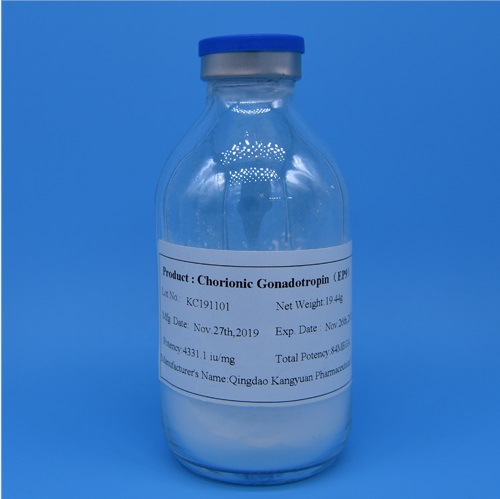In the ever - evolving landscape of reproductive medicine, Human Menopausal
Gonadotropin (hMG) has emerged as a vital tool for individuals and couples
striving to achieve their dream of parenthood. At Kangyuan, we recognize the
significance of hMG in this journey and are dedicated to providing in - depth
knowledge and top - tier services related to this hormone.
What is Human Menopausal Gonadotropin?
Human Menopausal Gonadotropin is a mixture of two crucial hormones:
follicle - stimulating hormone (FSH) and luteinizing hormone (LH). It is derived
from the urine of post - menopausal women. The unique combination of FSH and LH
in hMG mimics the natural hormonal signals that regulate the menstrual cycle and
play pivotal roles in the development of ovarian follicles and ovulation in
women, as well as spermatogenesis in men.
Functions of hMG in Reproductive Health
In Female Fertility
Ovarian Follicle Development
FSH in hMG stimulates the growth and maturation of ovarian follicles. In
women with ovulation disorders, such as those with polycystic ovary syndrome
(PCOS), hMG can be a game - changer. By providing the necessary hormonal boost,
it encourages the development of multiple follicles, increasing the chances of
successful ovulation. This is particularly important in in - vitro fertilization
(IVF) procedures. In IVF, controlled ovarian hyperstimulation with hMG aims to
produce multiple mature eggs, which can then be retrieved and fertilized in the
laboratory.

Ovulation Induction
LH in hMG, in combination with FSH, is essential for triggering ovulation.
Once the follicles have reached an appropriate stage of maturity, the LH
component of hMG mimics the natural mid - cycle LH surge. This surge causes the
dominant follicle to rupture and release an egg, a process known as ovulation.
Precise timing of hMG administration is crucial to ensure optimal ovulation for
natural conception or for the collection of eggs in assisted reproductive
technologies.
In Male Fertility
In men, hMG can also play a role in treating certain forms of infertility.
FSH in hMG stimulates the Sertoli cells in the testes, which are responsible for
nurturing sperm cells during their development. By enhancing the function of
Sertoli cells, hMG can potentially improve sperm production in men with low
sperm counts or impaired spermatogenesis. Additionally, LH in hMG stimulates the
Leydig cells in the testes to produce testosterone, which is essential for
normal sperm development and male sexual function.
hMG in Medical Practice
Fertility Treatments at Kangyuan
At Kangyuan, our team of experienced reproductive specialists is well -
versed in the use of hMG for fertility treatments. We offer personalized
treatment plans tailored to each patient's unique needs. Our state - of - the -
art facilities enable us to closely monitor the response to hMG therapy. Through
regular ultrasound scans and hormone level measurements, we can adjust the
dosage of hMG to optimize the development of follicles in women or the
improvement of sperm production in men.
Comprehensive Patient Support
We understand that the journey of fertility treatment can be emotionally
and physically challenging. That's why at Kangyuan, we provide comprehensive
patient support. Our experts are available to answer all your questions about
hMG, including its mechanism of action, potential side effects, and how it fits
into your overall treatment plan. We offer counseling services to help patients
cope with the stress associated with infertility and the treatment process.
In conclusion, Human Menopausal Gonadotropin is a powerful tool in the
field of reproductive medicine. Whether you're a woman struggling with ovulation
issues or a man facing infertility challenges, hMG, when used under the expert
guidance of Kangyuan's medical team, can offer new hope. If you're considering
fertility treatments or have any questions about hMG, don't hesitate to reach
out to us. Let Kangyuan be your partner in your journey towards parenthood.